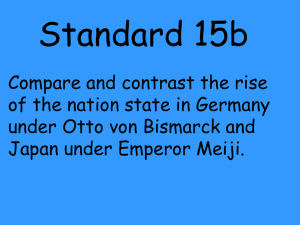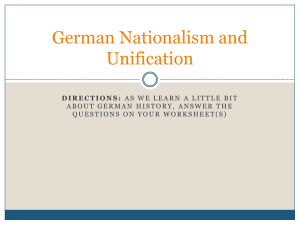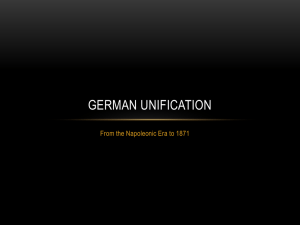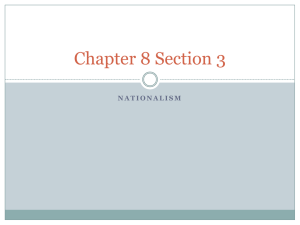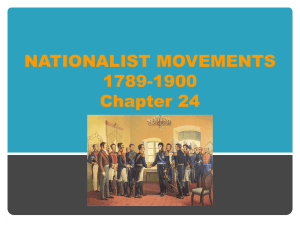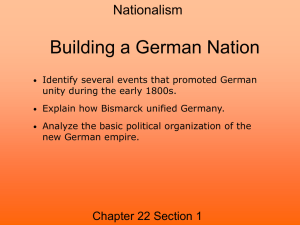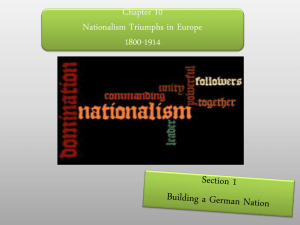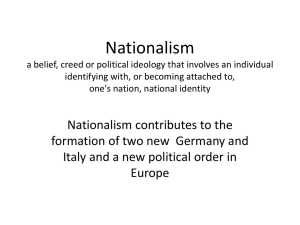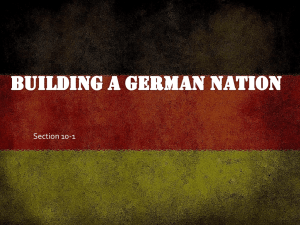File - Beechen Cliff School Humanities Faculty
advertisement
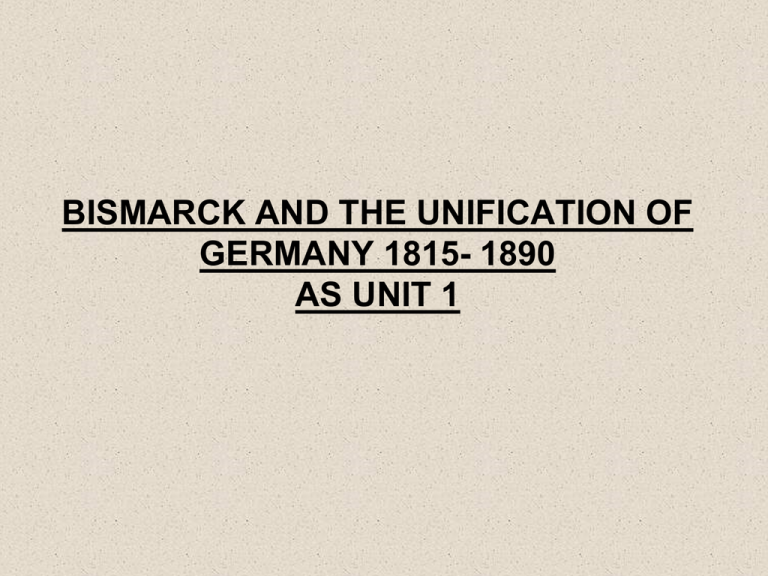
BISMARCK AND THE UNIFICATION OF GERMANY 1815- 1890 AS UNIT 1 OVERVIEW OF CONTENT 1. The German Confederation, 1815-48: i. Why was Unification unlikely in 1815? ii. What were the forces of change 1815-48? iii. ‘Peaceful Dualism’ Austrian political and Prussian economic control. 2. Revolutions in Germany 1848-49: i. The Frankfurt Parliament. ii. The Prussian Revolution. 3. The Rise of Prussia, 1850-62: i. Economic and Political developments. 4. Diplomacy and War, 1862-71: i. Bismarck, Master Planner or Opportunist. ii. The Polish Revolt 1863. iii. War with Denmark 1864. iv. Austro-Prussian War, the Seven Weeks War 1866. v. The Franco-Prussian War 1870-71. 5. Bismarck’s Germany 1871-1890: i. Developing a National Identity in a united Germany Bismarck’s relationship with political parties 1871 – 1890. ii. The ‘Kulturekampf’ and social policies under Bismarck 1871 - 1890 1. THE GERMAN CONFEDERATION 1815-1848. i. Why was German Unification unlikely in 1815? • The German Confederation was set up at the Congress of Vienna (1815) with 39 separate states all being controlled by separate rulers. • The Diet (Parliament) of the Confederation included representatives from each state chosen by the individual princes. It had little power as there was unanimous verdicts and no army or civil service. • ‘Peaceful Dualism’ meant that Austria and Prussia dominated and shared the control of Germany. The southern catholic states tended to look towards Austria for leadership and the northern, protestant states to Prussia. • The was cultural, religious and national disunity. Some non-Germans were part of the Confederation; some Confederation states were ruled by non-Germans and parts of the Habsburg Empire was outside of the Confederation. There was also the catholic/protestant divide. • The Junkers (aristocratic landowners) dominated society. The army and civil service were dominated by the aristocracy and there was little industry or large towns. 1. THE GERMAN CONFEDERATION 1815-1848. ii. What were the forces for Change between 1815 and 1848? • The Zollverein: It grew out of the Prussian Customs Union (1818) which got rid of customs barriers within Prussia. In 1830 Hesse-Cassel left the rival Middle Union and joined the PCU. The Middle Union collapsed and 18 states joined the PCU to form the Zollverein in 1834. By 1848 only Austria, Hanover, Oldenburg, Mecklenburg and the Hanseatic towns were NOT in the Zollverein. • The Growth of German Nationalism: Students and educated Middle Classes demonstrated in Wartburg (1817) and Hambach (1832) • The Growth of Liberalism: Students and the educated Middle Classes campaigned for a Constitution and liberal measures e.g. in Baden in the 1840s. 2. REVOLUTIONS IN GERMANY IN 1848-9. • WHY DID REVOLUTIONS BREAK OUT? •Long Term: Rising Middle Class wanting political representation; increase in population which led to food shortages and industrialisation which led to a growth of poor living and working conditions in the expanding towns. •Short Term: Harvest failures in 1846 and 1847; Trade recession in Europe in 1847 and other revolutions in Europe e.g. Paris, Hungary and Vienna. •WHAT WERE THE MAIN DEVELOPMENTS IN THE REVOLUTIONS? •THE FRANKFURT PARLIAMENT: •Set up by the ‘Vorparlement’ the Frankfurt Parliament was a liberal dominated assembly of 596 men from all states given the task of drawing up a Constitution for a United Germany. •However, it FAILED because: • it became a ‘talking shop’ without real action; there were too many different representatives who called for different things e.g. ‘Kleindeutschland’ (a small Germany without Austria) or ‘Grossdeutschland’ (a larger Germany to include Austria); it had no real power (no army or civil service) and it lacked the support of the masses. 2. REVOLUTIONS IN GERMANY IN 1848-9. • THE REVOLUTION IN PRUSSIA: •Demonstrations and riots in Berlin 13th-19th March 1848 led to Frederick William IV to accept the election of an Assembly to draw up a new Liberal Constitution and new Liberal Ministers (21st March). (After he appeared on the balcony 18th March and ordered removal of crowds which led to c.300 deaths) •The Assembly spent March-December trying but failing to agree. •In August in opposition the Junkers set up ‘The League for the Protection of Landed Property’ (‘The Junker Parliament’) which aimed to abolish the Prussian Assembly and new Ministers. •After concluding the War with the Danes FW IV regained control and gained the support of the Middle Classes (as they disliked the worker riots). He dismissed the new Liberal Ministers and in December 1848 dissolved the Assembly by Royal Decree. •However, he granted his own Constitution in December 1848 which had: an upper and lower house (Lower house voted for by universal manhood suffrage); granted liberal measures e.g. Free Press and legal system. However, he could alter it at any time e.g. in an emergency he could suspend civil rights and collect taxes; he also appointed his own Ministers and controlled the army. •Nevertheless Liberals and Nationalists preferred it to the Frankfurt Parliament. 2. REVOLUTIONS IN GERMANY IN 1848-9. •WHAT WAS THE IMPACT OF THE REVOLUTION ON WHO CONTROLLED THE CONFEDERATION? •The Erfurt Union: Following the failure of the Frankfurt Parliament the Prussian Army General von Radowitz proposed the setting up of the Erfurt Union, a ‘kleindeustchland’ led by Prussia with ‘special links’ to Austria. •Set up in May 1850, 28 states joined. •Austrian Chief Minister Schwarzenberg saw the Erfurt Union as an attempt by Prussia to take over the control of Germany. He summoned a meeting of the old Confederation Diet and proposed a ‘Grossdeutschland’ under the leadership of Austria. •A Revolution in Hesse-Cassel broke out and they turned to the Diet for help in sorting out their problems. However, it was a member of the Erfurt Union. Austria and Prussia therefore conflicted who should help and it led to small scale fighting between the two in October 1850. •The Olmutz Declaration: anxious to avoid war the Prussian Minister President Manteuffel agreed to abandon the Erfurt Union at Olmutz on the 29th November 1850. •However, Prussia confirmed its economic control after Austria attempted to set up a rival Customs Union to the Zollverein called the Zollunion. Its failure meant: •PRUSSIA KEPT ECONOMIC CONTROL V AUSTRIA KEPT POLITICAL CONTROL. 3. THE RISE OF PRUSSIA, 1850-1862. •WHAT WERE THE MAIN ECONOMIC DEVELOPMENTS IN PRUSSIA 185062? •Prussia had an ‘Industrial Revolution’ due to an abundance of raw materials in the Saar, Ruhr and in Silesia. •The Railways developed massively: 1845: 3,280 km to 1860: 11,633 km. This helped with trade to other countries and would later help mobilise the Prussian Army. •Foreign trade doubled. •Entrepreneurs and Iron and Steel Magnates like Alfred Krupp and his Needle gun would assist economic developments which would later help the army. •Prussia developed an extensive Banking System. 3. THE RISE OF PRUSSIA, 1850-1862. •WHAT WERE THE MAIN POLITICAL DEVELOPMENTS IN PRUSSIA 18501862? •The Crimean War led to Austria proposing a Prussian/Austrian Alliance against Russia. This upset the Russians and ended the ‘Holy Alliance’. Prussia stayed neutral. •William I becomes the Prussian King in 1858. He keeps the Constitution but replaces Manteuffel with a ministry of conservatives and liberals. •1859 Austria is humiliated in defeat at War with France and Piedmont which cripples her army and economy. •The Liberals in Parliament in 1859 set up the ‘Nationalverein’ which aimed at German unity through Prussian Leadership. •1860-62 the new Minister for War General Von Roon tried to pass an ‘Army Bill’ (to increase conscription time from 2-3 years; doubling the size of the army and reducing the role of the ‘Landwehr’ or middle class civilian militia. •1860-62 Parliament repeatedly refused to pass the Bill. •June 1861 Radical liberals set up the ‘Progressive Party’ which aimed to have a people’s army controlled by a parliament rather than an army controlled by the King. They gained 110 seats in Parliament in Dec1861 and had an overall majority in May 1862. •This became a major CONSTITUTIONAL CRISIS. As a result von Roon persuaded William I to appoint Bismarck as Minister President to sort the problem out and to get the Army Bill passed. 4. DIPLOMACY AND WAR, 1862-71. BISMARCK •Bismarck was appointed Minister President in 1862. He quickly solves the Constitutional crisis by overriding Parliament. When the Progressives told people not to pay taxes, Bismarck replied he had an army of 200,000 soldiers ready to persuade them to pay! Bismarck then ruled Germany without Parliament for the next 4 years. He later got the Prussian Parliament to pass the Indemnity Bill which forgave him for all his actions taken during the 4 years that he had ruled without them. MASTER PLAN? Bismarck later declared that he had carefully planned unification of Germany in 5 clear steps from 1862. He said that he had planned: 1. To Obtain Russian Neutrality 2. To trick Austria into declaring War 3. To ensure French Neutrality 4. To Treat Austria Leniently after Defeat. 5. To Trick France into Declaring War. OPPORTUNISM? •There is no doubt that Bismarck had a favourable ‘deck of cards’ handed to him in 1862 and not all events were planned as he suggested. He inherited: a favourable European diplomatic situation; a formidable economy, a powerful army and a liberal education system. 4. DIPLOMACY AND WAR, 1862-71. THE POLISH REVOLT 1863. CAUSES: •Poland had been divided between Russia, Austria and Prussia in the 18th Century. •Poles in Russia revolted in 1863 because they wanted independence from the absolutist rule of the Tsar. •Bismarck feared the Poles in Prussia would also revolt and decided to take action. EVENTS: •Bismarck offered assistance against the Russian Poles but was refused. At the ‘Alvensleben Convention’ Bismarck agrees to send any Polish rebels back to Russia if they escaped over the border. •Austria and France condemn this action and Prussian Liberals call for his dismissal. As a result Bismarck is forced to deny the agreement existed. CONSEQUENCES: •Russia was angered by Bismarck’s denials. However, she was more angry at Austria after the Crimean War. Therefore Russia was likely to remain neutral if a war broke out between Austria and Prussia. 4. DIPLOMACY AND WAR, 1862-71. WAR WITH DENMARK 1864. CAUSES: •King Frederick VII of Denmark who ruled North German states of Schleswig and Holstein died leaving no heir. It led to a succession dispute between the German Prince of Augustenburg and the Danish Christian of Glucksburg. EVENTS: •Prussia supported the German Prince and Austria, scared that German states would see Prussia as upholding German interests decided to join with Prussia to invade Schleswig and Holstein on Augustenburg’s behalf. •Prussia and Austria defeated the Danes quickly. At the Treaty of Vienna in October 1864 Prussia and Austria agreed to jointly control both territories. However, Prussia wanted to control the territories while Austria wanted control to go to Augustenburg. •The Convention of Bad-Gastein decided that Prussia would govern Schleswig and Austria would govern Holstein. CONSEQUENCES: •This situation now meant that relations between Prussia and Austria began to deteriorate rapidly. It ultimately led to the outbreak of the Seven Weeks War between them. 4. DIPLOMACY AND WAR, 1862-71. THE SEVEN WEEKS WAR BETWEEN AUSTRIA AND PRUSSIA JUNE-JULY 1866. CAUSES: •Tensions between the two states grew over Schleswig and Holstein. •Prussia made a secret alliance with Italy in April 1866 whereby Prussia promised to declare war on Austria within 3 months and hand Venetia over to Italy in the event of victory. EVENTS: •Bismarck meets Napoleon III at Biarritz in October 1865 to try to gain French neutrality in the event of an Austro-Prussian War. Napoleon agrees to gain Venetia which she would then hand to Italy. •Bismarck puts forward plans to reform the German Constitution which would give Prussia increasing control. The Austrians obviously oppose it and in anticipation of further trouble, in defence, they mobilise their armies in April 1866. Prussia is now given the excuse they needed and invades Holstein. However, the Austrians withdraw to the annoyance of Bismarck. •He then asks for states support against Austria and when he receives none, he invades and takes over Hanover, Hesse-Cassel and Saxony. •With the help of the Italians (Austria has to fight on 2 fronts) Prussia decisively defeat the Austrians at Konnigratz/Sadowa on 3rd July 1866. 4. DIPLOMACY AND WAR, 1862-71. THE SEVEN WEEKS WAR BETWEEN AUSTRIA AND PRUSSIA JUNE-JULY 1866. EVENTS CONTINUED: •William I, von Roon and other leading Generals like von Moltke wanted to march onto Vienna and bring Austria under Prussian control. Bismarck dramatically advised against this and advises that Prussia should end the War. (He was worried that France and Russia might get involved to stop them). Bismarck organises for the Prussians and the Austrians to meet at Prague in August 1866. CONSEQUENCES: •The Treaty of Prague in August 1866 was incredibly lenient on Austria. The North German Confederation is set up and Germany is now divided into: The North German Confederation (led by Prussia) and Austria and 4 independent South German States which formed themselves into a union (Bavaria, Wurrtenberg, Baden and Hesse-Darmctadt) also Austria lost Venetia to the Italians (through France) •Secret Military alliances were soon made with the Southern States whereby the Southern States whereby the Southern States promised to fight with the Prussia in the event of war with another country. •In 1867 the Zollverein was remodelled to include a Zollparlament – who’s job it was to discuss Zollverein policy, of which the southern states were members. •Austria was militarily and economically crippled and France had not joined the War as a result of Bismarck ending it early. 4. DIPLOMACY AND WAR, 1862-71. THE FRANCO-PRUSSIAN WAR 1870-1871. CAUSES: •The Luxemburg crisis: In 1866 Napoleon III worried about Prussia’s increasing strength demanded Luxemburg from the King of Holland. •Bismarck initially supports the French claim, but by the end of 1866 is trying to gain support for a German ruled Luxemburg. •The Hohenzollern Candidature Crisis: In 1868 revolutionaries drove the Queen of Spain out of the country leaving a Spanish succession crisis. In February 1870 the Spanish Parliament offers the throne to Leopold of Hohenzollern, who was related to the Prussian Royal family. Prussia had a choice: to accept the throne would give them Spain as an Ally but it would worry the French. •The Ems Telegram: On the 12th July 1870 Leopold of Hohenzollern’s father withdrew his son as a candidate. On the 13th July 1870 the French Ambassador Count Benedetti met William I at the German town of Ems. William accepted the withdrawal of Leopold, but refused to accept the further French demand that Leopold withdraws permanently. •William sends Bismarck a telegram describing his talks with Benedetti and gives Bismarck permission to release it to the press. •Bismarck releases his own version of the telegram which angers the French so much that they declare war on Prussia on the 19th July 1870. 4. DIPLOMACY AND WAR, 1862-71. THE FRANCO-PRUSSIAN WAR 1870-1871. EVENTS: •The highly effective and efficient Prussian Army (including representatives from the 4 southern states) cut a large section of the French Army off at the French city of Metz. •On the 2nd September 1870 the Prussians defeat the French at the Battle of Sedan Hill. •On the same day the French surrendered to the Prussians – Napoleon III was taken prisoner and held in Cassel until the Spring of 1872 before he fled to England and died the following year. •The Prussians kept advancing until they reached Paris and on the 18th January they humiliated the French by declaring a fully united German Empire led by King William I at Versailles. CONSEQUENCES: •A united German Empire with William I as the Emperor was set up on the 18th January 1871. BISMARCK’S ROLE IN GERMAN UNIFICATION Key questions: •Did Bismarck have a ‘Master Plan’ for Unification? •What other factors were involved in the Unification process? (Factors outside of Bismarck’s control that he used as an opportunity). •To what extent were the actions of others responsible for unification? E.g. Napoleon III MASTER PLAN? Bismarck later declared that he had carefully planned unification of Germany in 5 clear steps from 1862. He said that he had planned: 1. To Obtain Russian Neutrality 2. To trick Austria into declaring War 3. To ensure French Neutrality 4. To Treat Austria Leniently after Defeat. 5. To Trick France into Declaring War. EVIDENCE: • He said he obtained Russian neutrality through the ‘Alvensleben Convention’ of 1863. • He said he tricked Austria into War with Prussia by setting up the argument over Schleswig and Holstein. • He ensured French neutrality for the Austro-Prussian War by making an agreement with Napoleon at Biarritz in October 1865. BISMARCK’S ROLE IN GERMAN UNIFICATION MASTER PLAN? EVIDENCE CONTINUED: • He ensured Austrian neutrality in the future Franco-Prussian War by treating the Austrians leniently at the Treaty of Prague in August 1866. He did persuade William and von Roon NOT to march onto Vienna. He did ensure that most states were united in the North German Confederation in the Treaty of Prague. • He manipulated France into declaring War on Prussia (and he had already made secret military agreements to gain the support of the Southern States) through the Hohenzollern Candidature Crisis and his skilful editing of the Ems Telegram. WHO SUPPORTS THE MASTER PLAN VIEW? • Bismarck himself! Early German Historians. OPPORTUNISM? Bismarck had a favourable ‘deck of cards’ handed to him in 1862. He inherited: a favourable European diplomatic situation; a formidable economy, a powerful army and a liberal education system. However, many historians believe that after 1862 there were circumstances outside of Bismarck’s control that he used to benefit Prussia and therefore they believe he was more of an Opportunist. EVIDENCE: • Actions of the Poles: How could Bismarck have known in advance that the poles would rebel? It is more likely he offered Russia support because he feared revolts in Prussian Poland. The fact he nearly lost his job as a result of Liberals and Britain and France condemning his agreement with Russia suggests his actions were NOT planned. BISMARCK’S ROLE IN GERMAN UNIFICATION OPPORTUNISM? EVIDENCE CONTINUED: •The Neutrality of Russia: Bismarck actually upset the Russian Tsar through denial of the Alvensleben Convention. He was lucky that Austria had upset the Tsar more during the Crimean War. He could not guarantee Russian neutrality as result. •The Schleswig-Holstein Affair: Bismarck kept trying to use diplomacy instead of War right up to the outbreak of War. If he planned War why did he do this? •Actions of Napoleon III: It was Napoleon and NOT Bismarck who started the tension between France and Prussia by demanding Luxemburg in 1866. It was also aggressive French diplomacy over the Hohenzollern issue (Benedetti demanding William permanently ban his Hohenzollern cousin from accepting the Spanish throne) which allowed Bismarck to publish his version of the Ems Telegram. He could not have known in advance about how aggressive France was going to be! CONCLUSIONS: • Bismarck was a skilful politician who was most probably a Prussian Supremacist who wanted Prussian expansion at the expense of the Austrians. It is most unlikely that he planned unification from the start and more likely that he used opportunities when they presented themselves to benefit Prussia, initially and later, for Germany. Bismarck’s Germany: Establishing a National Identity •The German Constitution: •Germany was to be a Federal State. Powers and functions were divided between the Central or Federal Government and the 25 state Governments. The States preserved their own rulers, parliaments and administration systems. The Prussian King was head of the executive, the Civil Service and in charge of the army. Prussia controlled over 60% of all Germany and had 235 deputies out of 397 deputies in the Reichstag. This has often been called ‘Prussianisation’ of Germany. •After 1871 Bismarck became Imperial Chancellor and his influence over William gave him extensive powers. He loathed rivals and ruled virtually like a Dictator. But the Federal system and the Reichstag curtailed his powers. •The new Reich was certainly not united. Minorities formed 10% of the population. There were also economic and social divisions between rich and poor; east and west; industrialised North and rural south. Bismarck’s Germany: Establishing a National Identity The Liberal Era 1871-79: •After 1871 Bismarck needed a parliamentary majority and had little alternative but to work with the National Liberals for most of the decade. •However, relations between Bismarck and the National Liberals were always uneasy. Bismarck did not agree on their hopes for extension of Parliamentary Government. He disliked having to rely on them to pass legislation and became irritated when they opposed his proposals. •The Army budget was a particular problem until 1874 when Bismarck forced them to accept (eventually) the military budget to be fixed for 7 years at a time which undermined the Reichstag’s powers. Bismarck’s Germany: Establishing a National Identity; The Kulturkampf. •One of Bismarck's primary political objectives was to reduce the influence of the Catholic church in Germany. •Prussia (except the Rhineland) and most other northern German states were predominantly Protestant, but many Catholics lived in the southern German states. In total, one third of the population was Catholic and Bismarck believed that the Roman Catholic Church held too much political power. The government tried to Germanize the state's national minorities, situated mainly in the borders of the empire, such as the Danes in the North of Germany, the French of Alsace-Lorraine and the Poles in the East of Germany. They were all Catholic and potential opponents of Bismarck. •He became increasingly concerned about the emergence of the Catholic Centre Party (after 1870). He tried unsuccessfully to get the Vatican and German Bishops to withdraw support for the Party. But on the Vatican’s refusal he severed relations in 1872 and stepped up anti-catholic measures. Bismarck’s Germany: Establishing a National Identity and the Kulturkampf Accordingly, he began an anti-Catholic campaign known as the Kulturkampf ( the ‘struggle for culture’). In 1871, the Catholic Department of the Prussian Ministry of Culture was abolished. In 1872, the Jesuits were expelled from Germany. •More severe anti-Roman Catholic laws of 1873 (the May Laws) allowed the government to supervise the education of the Roman Catholic clergy, and curtailed the disciplinary powers of the Church. In 1875, civil ceremonies were required for weddings, which could hitherto be performed in churches. Subsidies would be suspended from 1875 to all churches who refused to comply. By 1876 10 of the 12 Catholic Bishops were in exile or under house arrest. More than 1000 priests had been suspended. •However, Bismarck’s efforts with the Kulturkampf only ended up strengthening the Catholic Centre Party. Bismarck was forced to abandon the Kulturkampf in 1878 to preserve what political capital he had left. •Pius died that same year, replaced by a more pragmatic Pope Leo XIII who would eventually establish a better relationship with Bismarck. Bismarck’s Germany: Establishing a National Identity – The Economic Crisis. •In 1873, Germany and much of Europe had entered the Long Depression beginning with the crash of the Vienna Stock Exchange in 1873, the Gründerkrise. A downturn hit the German economy for the first time since vast industrial development in the 1850s after the 1848–49 revolutions. •To aid faltering industries, the Chancellor abandoned free trade and established protectionist tariffs, which alienated the National Liberals. The Kulturkampf and its effects also stirred up public opinion against the party that supported it, and Bismarck used this opportunity to distance himself from the National Liberals. • This marked a rapid decline in the support of the National Liberals, and by 1879 their close ties with Bismarck had all but ended. Bismarck instead returned to conservative factions — including the Centre Party — for support and was allowed to pass the Tariff Bill in July 1879. Bismarck’s Germany: Establishing a National Identity – Socialism. •In 1875 the German Social Democratic Party (SDP) was formed with the key aim of overthrowing the existing order and Nationalising Banks, Mines and Industry. •Bismarck was hostile to them and in 1876 tried to pass a bill to prevent socialist propaganda being published. It was defeated. But after 2 assassination attempts on William Bismarck finally got his way. Working with the Conservatives and National liberals an anti-socialist bill was passed in October 1878. Socialist organisations like Trade Unions were banned and between 1878 and 1890 c. 1,500 socialists were imprisoned and many emigrated. •But after a dip in 1878 the SDP won increasing support and by 1890 had over a million voters and 35 seats. Bismarck’s attack on Socialism had failed. •State Socialism: •Bismarck’s most important legacy was the welfare measures he introduced designed to assist German Workers in times of need. •1883 The Sickness Insurance Act provided medical treatment and up to 13 weeks sick pay (worker’s contributed 2/3rds and employers 1/3rd). A worker who was permanently disabled was supported by the Accident Insurance Act of 1884 and in 1889 the Old Age and Disability Act which gave pensions to those over 70 and disablement pensions to younger workers. •These Acts were the first of their kind and became a model copied world wide. Bismarck: Treatment of the Minorities and his final years in power. •Bismarck regarded the Minorities as ‘enemies of the state’. He outlawed the Polish Language in Education and law Courts; Alsace-Lorraine was ruled directly by Prussia as a ‘special region’. The German Language was imposed in schools and local administration. The French who were unhappy with German rule were allowed to leave and 400,000 had by 1914. School, conscription and everyday experience ‘Germanised’ many minorities. •Final Years of Power: •The Late 1880s were difficult for Bismarck. William was old and frail and his son Crown Prince Frederick who was Liberal would take the throne. •In 1887 Bismarck and the Reichstag argued again over renewal of army grants. The Reichstag forced him to compromise by reviewing military expenditure every 3 years. Bismarck was furious and working with the Conservatives and Liberals passed his bill. •Frederick was only on the throne for 3 months after William died (he died of cancer), so Frederick’s 29 year old son William II became King. Bismarck assumed he was secure. However, William wanted to rule as well as reign and finally in 1890 was forced to resign. Bismarck is reported to have said ‘King’s are dangerous if they have real power’. •Bismarck finally died in July 1898. EXAM QUESTIONS THE EXAM: 1 Hour 20 Mins for BOTH Italy and Germany. You should spend about 40 mins on the Germany essay. Choice 1 out of 2. PAST PAPER QUESTIONS: 1848 REVOLUTIONS: •Why did Revolutions break out in Germany in 1848? [30] •How near to achieving German unification did its supporters in Germany come in the years 1848-9? [30] •Why did the 1848 Revolutions fail in Germany? [30] PRUSSIAN DEVELOPMENTS: •How did Prussia develop to take on the leadership role of Unification of Germany 1815-71? [30] BISMARCK: •How far was Bismarck’s diplomatic skill responsible for bringing about the unification of Germany in the years1862-1871? [30] •How far did Bismarck plan the Unification of Germany 1862-1871? [30] EXAM QUESTIONS DIPLOMACY AND WAR 1862-71: •Why was Prussia able to defeat Austria in the struggle to control Germany in the 1860s? [30] •How important was the strength of the Prussian economy in explaining Prussia’s success in unifying Germany in the years 1864-71? [30] •To what extent was it the quality of the Prussian army that determined the process and course of German unification between 1863 and 1871? [30] •What factors worked against the inclusion of the southern states within a united Germany in 1866, but nevertheless worked for their inclusion by 1871? [30] EXAM TIPS: Questions – for Bismarck and Diplomacy and War Questions remember PRIME factors!! Political Role of Bismarck International Situation Military Economy EXAM QUESTIONS PRACTISE A QUESTION WHICH ASKS FOR HOW GERMANY BECAME UNITED 1862-71: INTRO: Situation in Germany 1862/3. Austria’s economy weak after defeat in 1859 War with Italy and France. Politically weakened by deteriorating relations between her and Russia after Crimean War. Prussian economy formidable and meant Prussia was in the position of being able to lead German Unification. By 1871 the ‘German Empire’ was proclaimed with William I of Prussia as the Emperor. There are a number of factors why this occurred: Political developments; the Role of Bismarck; the International Situation, the Prussian Military and the Prussian Economy. POLITICAL: ROLE OF BISMARCK: INTERNATIONAL SITUATION: MILITARY (PRUSSIAN): ECONOMY (PRUSSIAN): CONCLUSION: Sum up all the reasons and say which is the most important and why in answer to the question set! EXAM QUESTIONS Bismarck’s Germany: •To What extent was Bismarck’s policy of Kulturekampf a success? [30] •To what extent was Bismarck’s dealings with political parties successful in the years 1871-1890? [30] •How did Bismarck attempt to create a National Identity in Germany and to what extent was this a success? [30] •To what extent was the Kulturekampf a political misjudgement by Bismarck? [30] •What policies introduced by Bismarck were most successful in the years 18711890? [30]
